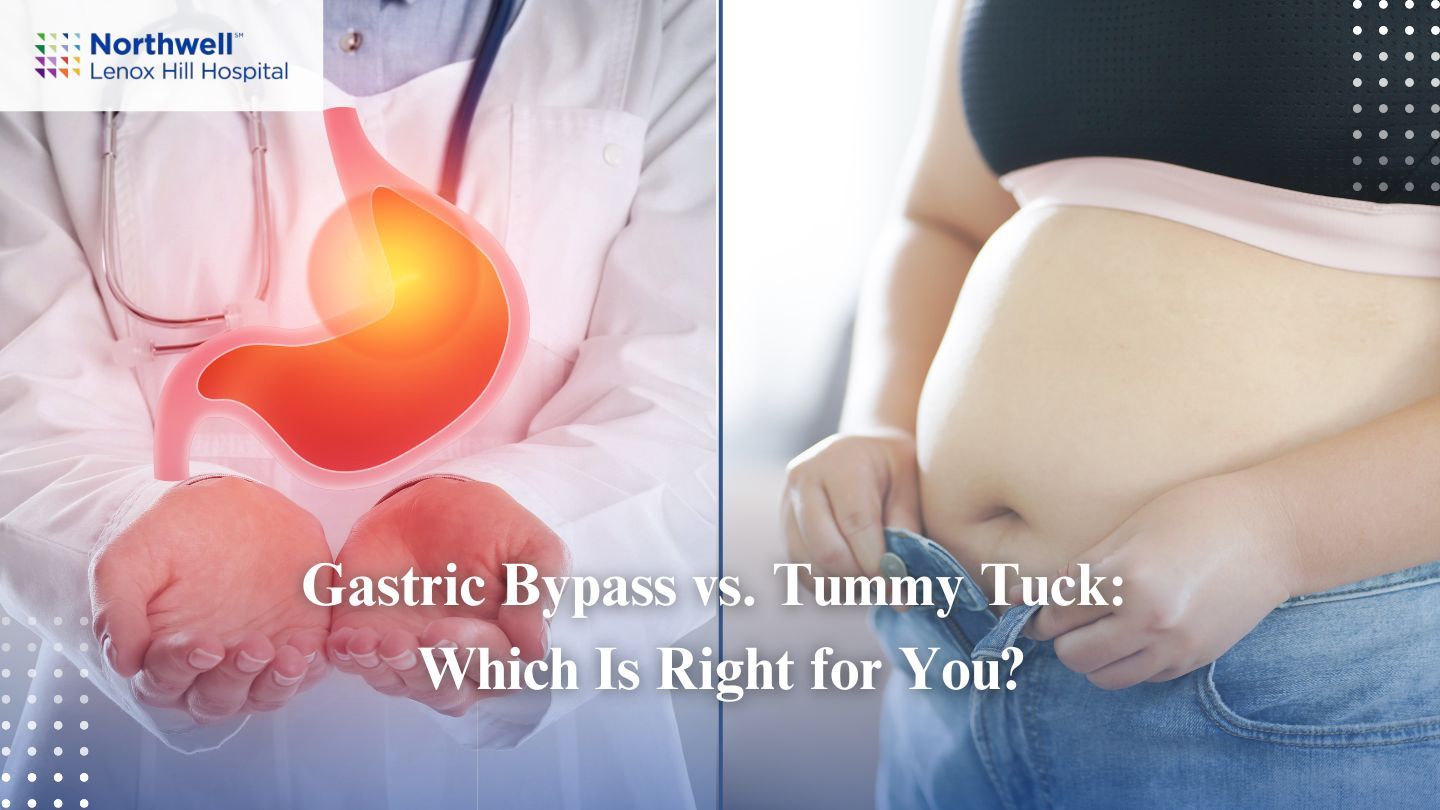
Gastric Bypass vs. Tummy Tuck: Which Is Right for You?
Deciding between gastric bypass vs tummy tuck? This guide will help you understand the key differences. Discover which surgery suits your health goals.
Key Takeaways
- Gastric bypass surgery aims to help individuals lose weight significantly and improve health, while a tummy tuck focuses on aesthetic enhancement and body contouring without aiding in losing weight.
- Eligibility criteria differ: gastric bypass requires a BMI of 30 or greater, while a tummy tuck is suited for individuals at or near their target weight with excess skin.
- Both procedures entail distinct recovery processes, with gastric bypass typically allowing for quicker recovery due to minimally invasive techniques, compared to the more intensive recovery needed after a tummy tuck.
Understanding Gastric Bypass Surgery

The Roux-en-Y gastric bypass is an effective bariatric surgery for those struggling with obesity. It involves creating a small stomach pouch and rerouting the small intestine, which limits food intake and reduces calorie absorption. This helps individuals feel full quicker and eat less.
Beyond weight loss, this surgery can significantly improve health conditions like sleep apnea, type 2 diabetes, and high cholesterol, often leading to complete remission. Patients often experience increased energy and improved quality of life, making everyday activities easier.
Gastric bypass surgery aims for lasting weight management and overall well-being, addressing deep-seated factors contributing to obesity-related complications. The benefits extend beyond weight reduction, offering extensive health improvements.
Overview of Tummy Tuck (Abdominoplasty)

An abdominoplasty, or tummy tuck, enhances the midsection’s appearance by tightening abdominal muscles and removing excess skin and fat. Unlike weight loss surgeries, it focuses on body contouring rather than significant weight reduction. This procedure can improve body image by addressing issues like surplus fat around the navel or sagging abdominal skin.
Tummy tucks often eliminate lower abdomen stretch marks, resulting in a smoother, firmer look. Liposuction is frequently used to refine the area for optimal contouring, removing extra skin that may hang after significant weight loss.
Successful recovery requires diligent post-surgery care, including wearing compression garments to aid healing and minimize fluid buildup. This procedure not only refines physical appearance but can also boost self-confidence and positive body perception.
Key Differences Between Gastric Bypass and Tummy Tuck

Understanding the distinct objectives of gastric bypass and tummy tuck surgeries is crucial for an informed decision. Gastric bypass targets significant weight reduction to boost health, whereas a tummy tuck aims at aesthetic improvement through the elimination of excess skin and fortification of abdominal muscles. This contrast emphasizes the importance of selecting a procedure that aligns with personal requirements and anticipated outcomes on one’s weight loss journey.
Surgical Goals
Gastric bypass surgery is designed for significant weight loss and improved health, targeting long-term weight reduction and alleviating obesity-related conditions. Tummy tuck surgery, on the other hand, focuses on cosmetic enhancement by removing excess skin and tightening abdominal muscles, commonly chosen by those who have lost significant weight or mothers post-pregnancy. While both procedures offer transformative results, their goals differ: gastric bypass improves health, while a tummy tuck refines body contours.
Procedure Details
Gastric bypass is typically performed using minimally invasive laparoscopic methods, leading to faster recovery and reduced post-op pain. Patients usually stay in the hospital for about two days. Tummy tuck surgery takes 2-3 hours, with a six-week recovery period where strenuous activities should be avoided. Both procedures require diligent post-operative care for optimal results.
Eligibility Criteria
To qualify for gastric bypass, individuals must have a BMI of 30 or more and undergo a thorough evaluation by a multidisciplinary team to assess their readiness and tailor a surgical plan. For tummy tucks, ideal candidates are those at or near their target weight but dealing with excess skin unresponsive to diet and exercise, often post-weight loss or childbirth. Stable weight is crucial for the best outcomes from abdominoplasty.
Understanding these criteria is essential when considering either surgery. Consultations with medical specialists can help determine which procedure aligns best with your health needs and personal goals.
Benefits of Gastric Bypass Surgery

Undergoing gastric bypass surgery can lead to a multitude of advantages, starting with significant weight loss. This considerable reduction in weight has the potential to mitigate numerous health issues linked with obesity, such as sleep apnea, type 2 diabetes, and elevated cholesterol levels. The resolution or improvement of these ailments often results in an enhanced quality of life that includes increased energy and the newfound ability to participate in activities that were once difficult.
Gastric bypass offers enduring benefits by facilitating sustained weight loss, which helps diminish the likelihood of encountering future medical conditions. It represents not merely a method for shedding excess pounds but serves as a holistic strategy designed to boost overall health and wellness.
Benefits of Tummy Tuck Surgery

Tummy tuck surgery, known for offering substantial benefits both physically and mentally, effectively creates a more sculpted and firmer abdominal profile by removing excess skin and fat alongside fortifying weakened abdominal muscles. This procedure is particularly beneficial for individuals dealing with sagging skin due to significant weight loss, pregnancy, or aging, thereby improving the overall appearance of the midsection. This transformation can significantly elevate an individual’s self-confidence and enhance their perception of body image.
As with any surgical intervention, undergoing a tummy tuck comes with its share of potential risks, including complications from anesthesia, bleeding incidents, or infections. It is critical to engage in discussion with a board-certified plastic surgeon who can ensure that the procedure is performed safely while striving to meet your aesthetic goals.
Undertaking thorough pre-operative evaluations along with adhering to diligent post-surgical care are imperative steps in reducing any associated risks while optimizing the positive outcomes offered by this transformative procedure.
Making an Informed Decision
Determining the choice between a gastric bypass and tummy tuck surgery necessitates engaging with experienced healthcare practitioners. It’s crucial to understand each operation’s potential risks, advantages, and appropriateness for an individual’s condition.
Embracing beneficial lifestyle practices prior to undergoing surgery can aid in easing into a new way of living following the procedure.
Assessing Your Weight Loss Goals
When considering weight loss surgery, it’s essential to evaluate your weight loss goals. The procedure can significantly improve various aspects of life, such as boosting self-confidence, increasing mobility, enhancing social interactions, and alleviating depression and anxiety symptoms. Understanding the potential benefits helps set realistic goals for your weight loss journey.
Maintaining a stable body weight post-surgery is crucial for long-term success. Commitment to healthy eating and regular exercise ensures the lasting benefits of the surgical intervention.
Consulting with Medical Professionals
Consulting with expert plastic or bariatric surgeons is vital when exploring surgical options. Institutions like Donaldson Plastic Surgery have skilled teams to help determine whether a tummy tuck or gastric bypass surgery is right for you.
Understanding each surgery’s risks and benefits, along with professional medical advice, is essential for making an informed decision. Discussing your personal needs and lifestyle with your physician helps tailor the surgical plan to your unique circumstances.
The Role of Healthy Lifestyle Choices
Sustaining the outcomes of weight loss surgery necessitates a perpetual dedication to choices that promote a healthy lifestyle. It’s essential to embrace wholesome eating behaviors, partake in consistent physical activity, and seek continual medical supervision during your journey toward weight loss. Adopting a healthier way of living is instrumental not only in preserving the results of weight reduction but also in enhancing overall well-being and quality of life.
It’s equally important to stay adequately hydrated following surgery. Consuming at least six cups of fluids each day is recommended. Beginning with gentle exercises such as walking can facilitate recuperation while laying down the groundwork for an enduring exercise regimen, gradually building up your capacity post-surgery.
Summary
In essence, gastric bypass and tummy tuck procedures provide distinct transformative advantages tailored to their respective objectives. The primary goal of a gastric bypass is to promote significant weight loss that leads to enhanced health status, whereas the purpose of a tummy tuck is centered on cosmetic improvements through the elimination of excess skin and fortification of the abdominal muscles. These procedures can support or enhance an individual’s weight loss journey, catering to different health goals and aesthetic desires. Recognizing these distinctions, along with comprehending each surgery’s benefits and qualification requirements, is essential for an informed decision-making process.
Engaging in consultations with certified healthcare experts and adhering to a healthy lifestyle are vital steps toward securing optimal results from these procedures. Progress towards a healthier and more joyful existence by selecting options that resonate with your unique health needs and personal aspirations.
Why Choose Us?
At Lenox Hill Bariatric Surgery Program, we are dedicated to helping you achieve your health and aesthetic goals. Our experienced team offers comprehensive consultations and personalized care plans to ensure you receive the best possible outcomes. If you’re considering gastric bypass surgery in NYC, visit our website to learn more about our services and take the first step toward a healthier, happier you.
Frequently Asked Questions
What is the primary goal of gastric bypass surgery?
The primary goal of gastric bypass surgery is to achieve significant and sustained weight loss, which in turn enhances overall health. This procedure aims to address obesity-related health issues effectively.
What are the potential risks of tummy tuck surgery?
Tummy tuck surgery carries potential risks such as anesthesia complications, bleeding, infection, persistent pain, and poor wound healing.
It is essential to weigh these risks carefully before proceeding with the surgery.
How long does it take to recover from gastric bypass surgery?
Recovery from gastric bypass surgery typically involves a hospital stay of about two days, with full recovery taking several weeks.
It is important to follow medical guidelines during this period to ensure optimal healing.
What lifestyle changes are necessary after weight loss surgery?
Post-surgery, it is essential to adopt healthy eating habits, engage in regular exercise, stay hydrated, and maintain ongoing medical follow-up to support your health and sustain weight loss.